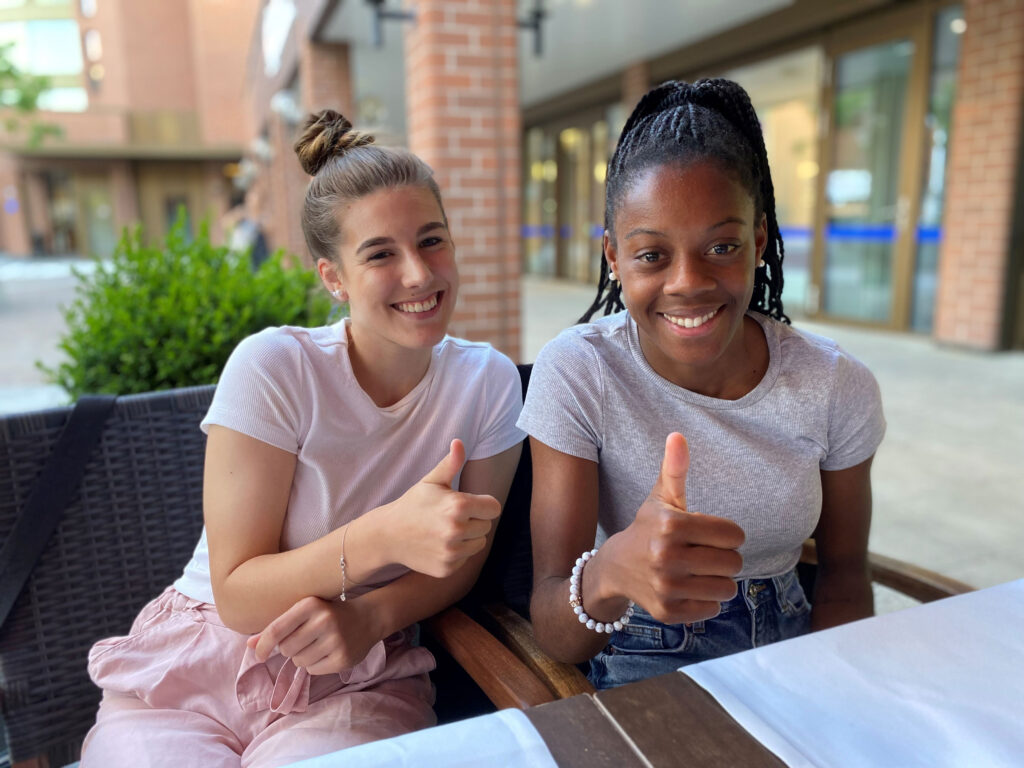Switzerland captain Lia Walti speaks to FIFA about life at Arsenal, FIFA Women’s World Cup ambitions and the upcoming Blue Stars/FIFA Youth Cup™.
- Switzerland captain Lia Walti has been speaking to FIFA
- Arsenal star looked ahead to the Gunners’ involvement in the Blue Stars/FIFA Youth Cup™
- She also reflected on the progress the women’s game has made ahead of this year’s FIFA Women’s World Cup™
Her Switzerland coach, Inka Grings, described her to FIFA as “magnetic”, “a dream player” and “a great leader”. For Jonas Eidevall, her boss at Arsenal, Lia Walti is quite simply “one of the best midfielders in the world”
High praise, it’s true, although few who have witnessed the 30-year-old’s performances in recent years could quibble with such compliments. Having yesterday signed a new contract with her high-flying English club, the Switzerland captain will follow up her involvement in a thrilling WSL title battle by leading her national team into their second FIFA Women’s World Cup™.
With these exciting challenges looming large on the horizon, Walti took time to speak to FIFA about club, country, the development of women’s football and the upcoming Blue Stars/FIFA Youth Cup™.
FIFA: Lia, Arsenal will be among the teams represented in your home country at the upcoming Blue Stars/FIFA Youth Cup. Would you have enjoyed the opportunity to play in tournaments like this as a youngster?
Lia Walti: Yes! Looking back at my childhood, it was mostly small tournaments we played,
or tournaments at weekends when we used to camp overnight. So yes, I would have loved to have had more of those tournaments as they gave me some of the best memories from my childhood. I’m sure that nowadays women and girls have more opportunities than 15 or 20 or years ago when I was at that age.
At the beginning [of my career] we could hardly make a living from the game, the pitch conditions were bad and there were only a few spectators. Now the time [for women’s football] has come, and everything is a bit closer to the men’s game. Not yet on a financial level, but the situation in general, with better pitch conditions, lots of fans, big stadiums and more support.
Arsenal’s U-19 team’s are among the teams taking part in the women’s tournament in Zurich next week. What can we expect from them?
I’ve been away from Switzerland for such a long time now that I don’t know, for example, how the level of U-19 teams there would compare [with Arsenal’s]. But I would say that our youth team is very physical. English football is very physical with fast, athletic players who’re very self-aware and courageous. They also definitely have more of a winning mentality than us Swiss. We are more restrained.
I would say that England is more passionate about football than any other country. There’s hardly anyone that doesn’t support a team. It’s just surreal. A lot of people are involved with Arsenal and it doesn’t matter if they’re fans or employees – they’ve lived and breathed it since they were kids, because their family supported Arsenal. In this way you automatically have a different connection to the club.
Please tell us about your experiences since joining Arsenal.
So much has happened! I came here to England five years ago, and at that time the German league was a bit better and tended to be the place where the best female players would go.
I came to Arsenal more as an instinct. I didn’t have much experience in the league and I didn’t know what to expect. Nobody expected such a boom. Looking at the size of the staff that we had at the time, I think they were like eight people, more or less, and now we have more than 20. Our attendance average was 1,000 to 2,000 when I started, and now we play certain big games in stadiums in front of 50,000 fans.
At the beginning I would have described the English league as less tactical but more physical because I went directly from Germany to England. Now, I have the feeling that it has become more tactical due to the improvement of the league and the fact that it now has a lot more top-level players. Personally, I learned a lot outside of football and more about the country [England], a new language and a completely different culture.
As a player, when you play every day with such great players, you get challenged on a daily basis. Plus, the league is so well balanced that there are no longer many games where you can only perform at 50 or 60 per cent.
Women’s football is, as you say, booming right now. How do you feel about the game’s development?
It’s hard to judge it because the development train is going so quickly. It depends where in the world you’re following it from. In Switzerland I think the train is going slowly in general, but it’s still moving forwards.
In many countries they’ve finally noticed, quite simply, that women can play and it’s worth investing in women’s football and giving it the same possibilities as the men. It’s worth it because people are interested in it. I’m glad to see the feedback from people who got interested in women’s football and mentioned that they didn’t know that it could be that fast and good.
How hard is it for you coming back to Switzerland to play and knowing that, because of your success at club level, people expect nothing less than an amazing performance from you?
Something great about my life and career is that I have always kept my feet on the ground and stayed true to myself. Sometimes I am just too self-critical. In some ways, and that makes it difficult sometimes, I take things too much to heart and take on too many responsibilities. The pressure in Switzerland is a bit different than here at Arsenal, because here the pressure is distributed over many players’ shoulders.
In Switzerland, we aren’t that big and the pressure is higher. That can be both positive and negative. When everything in my life is going well and I’m satisfied, in general I can deal with both success and failure, good and bad performances, and pressure. But there are also some bad phases that are hard, and some things just affect me more.
You helped Switzerland qualify for their second Women’s World Cup and first since 2015. What are your expectations for this year’s tournament?
If you ask all the national-team players that were at that [Women’s World Cup in 2015], they’ll tell you it was a career highlight. Maybe because it was the first achieved tournament in the history of [Swiss] women’s football, or in general the whole event in Vancouver: amazing city, great team, sun and a fantastic summer. I don’t know what it was but, once we’d experienced it, we wanted to do it again – and help the younger players be a part of it.
I’m excited, firstly to be in there with the best nations in the world and to be able to play against other teams from different continents and test how far we can go. The whole event is something we have to enjoy because we had a long and hard route to get there. We have to keep calm to bring out our best performances.
Who do you see as the favourites for the title?
In my opinion this is a tournament where many teams have an opportunity. For example, Sweden have been in nearly every semi-final for the past ten years. They have a good team. Germany have a strong side too. Regarding European teams, we could see six or seven of them in the quarter-finals, maybe with USA and Canada joining them. Australia as hosts could also be one, but they have a difficult group. I am excited to see how they manage it. I have a feeling that European teams will dominate the World Cup.
How do you see Switzerland faring?
I will say that we have a realistic chance to get through the group stage if we bring our A-game. In terms of the draw (Switzerland were pitted against New Zealand, Norway and Philippines in Group A), I think we were lucky. It definitely could have been worse. It’s also a dream to play against one of the hosts. We had that experience in Canada and it was amazing.
The aim is to get past the group stage, and what comes next depends on our opponents. We do have, of course, our limits, and from all the teams there we are maybe a bit behind. But when you are in the knockout phase it’s just one game and therefore anything is possible. If we manage to keep all of our players fit until the World Cup and arrive as the best version of ourselves, we have the potential to go far.
Your results this year have been a mix of draws and defeats. What is missing in getting you a win or two?
Goals! In many of those games we were very efficient in our high press. In the low block we could improve but we didn’t let much past us at the back. We have to manage to take better advantage of the opportunities we create in attack, be more patient in the final third and straightforward too: shoot more and make sure decisive passes are made.


